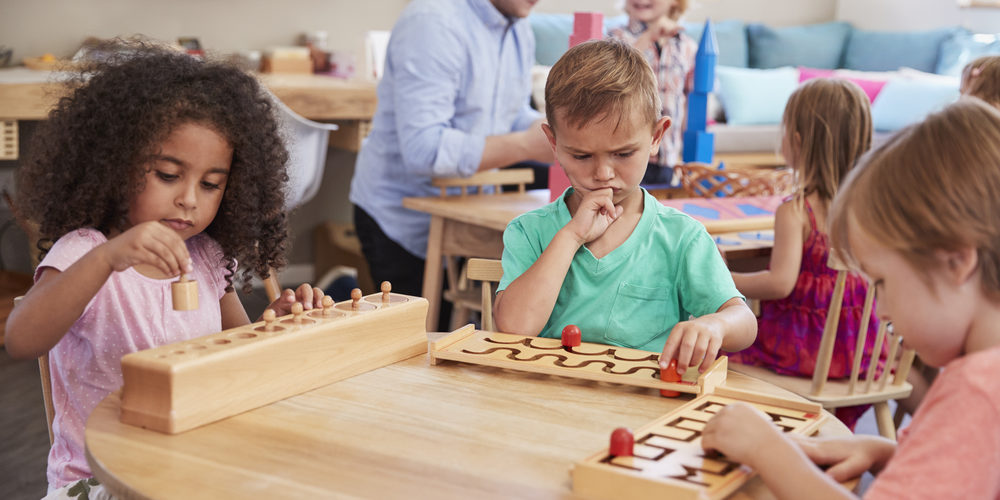Many parents worry that Montessori isn’t going to work for their children. Although the philosophy of Montessori is a tremendous draw for most, you fear that Montessori is too constrained or too flexible for your child. That’s why you started wondering, “Does Montessori work for every child?” It’s completely understandable that you would be concerned, because you want the best for your child.
Montessori wants the best for them, too, which is why classes are built to support the growth and development of every child.
Does Montessori Work For Every Child?
In 2018, Silvia Dubovoy, M.A., Ph.D. and AMI-certified Montessori teacher wrote for Montessori Public that “Montessori schools are an absolute haven for children with exceptionalities” and are “an excellent option.” Here are some of the reasons that she listed:
- Montessori teachers let every child in the classroom develop at their own pace without any distinctions
- Multi-age classrooms let children learn from each other
- Most classrooms keep the same teacher for three years
- Montessori classrooms are designed to create social cohesion instead of stressful competition
- Children are rarely, if ever, subjected to any kind of testing or grading. Instead, they learn at their own pace and with materials of their choosing
- The hands-on material support true learning without any pushing or pressure from others
There are dozens of ways Montessori teachers can assist children of all kinds. Regardless of their abilities and personalities, children can thrive in the right environment, such as the one you find at a school like Fishtown Montessori.
View this post on Instagram
Why Montessori Works For Children
Although Dubovoy makes fabulous points, there is still the question of why Montessori is adaptable and a good fit for most children. What makes Montessori so special that it succeeds where other educational systems fail?
Here are some ways Montessori works for children as well as some instances where it does not:
Different Learning Types
The flexibility of Montessori is what makes it work for every child. Materials are provided that entice the senses and get children working with their eyes, ears, and hands. The environment is also designed to allow for discovery, keeping children engaged throughout the school day.
Most children will devote their time concentrating on a chosen activity, repeating the task until they have mastered it. Montessori might not work for a child who loses interest quickly or who needs external motivation to continue working. Some children who require support with learning and understanding concepts may be overwhelmed when having to work alone.
However, Montessori teachers are well equipped with knowledge and skills that help them spot children with weaknesses and correct them. A teacher might approach a child who is struggling and offer a game or exercise that helps them feel more confident. Often, this is solely through the follow-the-leader process, in which the teacher demonstrates what is to be expected.
Special Needs
Wondering if a child with physical or mental limitations can enjoy Montessori? They can! Whether your child has been diagnosed with ADD/ADHD or something similar, they are welcome to the class. Slow learners are not pressured to complete their work at the same speed as exceptional learners.
Although some students may require redirection throughout the day to stay on course, Montessori teachers pay attention to the individual. They will craft a plan that will bring out the best in everyone.
Setting Routines
Planning ahead and making a comfortable routine doesn’t come naturally to everyone. Montessori teachers understand this, and so they will support students who need more guidance with the flow of the day.
The longer children remain within a Montessori school, the more comfortable they will be with the daily routine. They will also gain time management skills.
That said, it is important that children have a routine at home, too. In order for a Montessori education to be completely effective, elements have to be incorporated throughout the day. A child who goes from having a managed schedule at school to a laissez-faire setting at home will struggle to adapt to both situations.
Movement
You might be worried that the Montessori classroom isn’t designed for your energetic and excitable child. Don’t worry! Movement is entwined in the Montessori system. Yes, the classrooms you might observe are going to be quiet and contained, but that doesn’t mean the students are forced to sit still. You won’t hear the teachers yelling for children to calm down, and you won’t see chaos unfold. This happens because children are content and allowed to move when the need arises.
For children who have motor deficiencies, starting from the primary level, Montessori schools offer physical or outdoor activities that accommodate all levels of mobility. An example would be the teacher demonstrating simple yoga poses that include all students without calling attention to disability.
Similarly, hyperactive children don’t have to sit at a desk all day. In the Montessori classroom, a child with ADHD can get up, move around, exchange their materials, and give in to curiosities.
Looking For a Montessori School?
Does Montessori school work for every child? It is rare when it doesn’t! The Montessori philosophy does not discriminate or judge a child for what they can and can’t do. All children are supported in the classroom, and each individual is respected. Without the pressures of a regular school, even slower learners can thrive.
At Fishtown Montessori, our certified teaching staff have created incredible for young children, where they can discover something new every single day. If you are looking for a Montessori school, why not give us a call and schedule a virtual tour?






